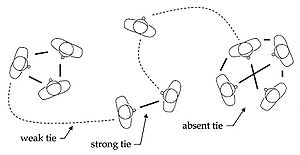
- Image via Wikipedia
By Debra Lauterbach; Hung Truong; Tanuj Shah; Lada A. Adamic
Download as PDF
Abstract: Reputation mechanisms are essential for online transactions, where the parties have little prior experience with one another. This is especially true when transactions result in offline interactions. There are few situations requiring more trust than letting a stranger sleep in your home, or conversely, staying on someone else’s couch. Couchsurfing.com allows individuals to do just this. The global CouchSurfing network displays a high degree of reciprocal interaction and a large strongly connected component of individuals surfing the globe. This high degree of interaction and reciprocity among participants is enabled by a reputation system that allows individuals to vouch for one another. We find that the strength of a friendship tie is most predictive of whether an individual will vouch for another. However, vouches based on weak ties outnumber those between close friends. We discuss these and other factors that could inform a more robust reputation system.
Notes: Can an online social network build enough trust to allow strangers to sleep on each others’ couches?

![Reblog this post [with Zemanta]](https://i2.wp.com/img.zemanta.com/reblog_e.png?w=625)

